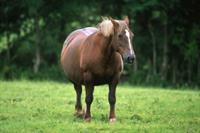Weight Gain is Hard on a Horse

A horse’s overall health status is affected by its body condition and weight. Some horses have no difficulty maintaining an ideal weight and require only the minimal amount of calories. However, as horses age, they are more likely to experience weight changes as their activity level and their metabolism rate slows. Horses that were once considered to be in optimal condition may now be retaining unhealthy body weight.
Body Condition: What the Client Can Watch For
Horse owners often do not see their overweight animals as being overweight, which is why veterinarians should take the time to explain to clients how to watch for any weight changes. A simple method to share with clients is to feel the horse’s ribs:
- Ribs should be felt for a slight indentation on each side,
- If there is no indentation, the horse is overweight.
- If there is a deep indentation, the horse is underweight.
While this method is not as consistent as the Body Condition Scoring System that veterinarians use, it is something easy that can be shown to clients as an aid to detect weight changes between veterinarian visits.
Feeding
Feed can help to attribute to weight gain in a horse in ways such as:
- Overfeeding
- Overfeeding is one of the main reasons that horses become overweight. A horse who stands around all day doesn’t realize that they don’t need the entire bucket of grain. If the grain is given to them, they will eat it!
- The choice of feed and use of concentrates
- Many owners lack a clear understanding of the nutritional needs of a horse.
- Many owners listen to recommendations from feed dealers rather than veterinarians and equine nutritionists.
- Many owners will purchase feed of a quality that is more than what their horse requires.
- Overfeed with intent to improve
- Some feeds are geared to enhance health or performance, and owners may overfeed the product because they believe it will help their animal.
- Quality of feed, particularly pastures, is changing
- Many pastures consist of plants that are intended for other livestock, and have a greater nutritional density than a horse needs.
- Overfeed because of:
- Owner overestimation of the amount of exercise the animal gets
- Owner underestimation of the amount of exercise a horse needs
Health Issues
There are many health issues caused by a horse being overweight, for instance:
- Laminitis:
- Metabolic and vascular disease that causes inflammation of the laminae
- When related to a metabolic cause, laminitis is most likely associated with obesity, but the connection is not clearly understood
- Signs of laminitis include:
- Abnormal hoof growth
- Dropped soles
- Unusual growth lines
- Separation of the hoof
- Insulin resistance:
- Occurs when insulin does not regulate the blood glucose effectively
- Causes include:
- Diet
- Possibly of feeds that are higher in starch and sugar
- Genetic predisposition that includes animals:
- With slower metabolic rates
- With easy weight gain
- Of certain breeds that appear less sensitive to insulin
- Horses with higher body condition scores are often less sensitive to insulin
- The relationship between the amount of fat coverage and insulin function is not clear, but what is known is that when an animal is obese and/or insulin resistant, there is an increased risk of laminitis.
- Visceral fat showed a greater correlation to insulin resistance than subcutaneous fat.
- Equine Metabolic Syndrome (EMS)
- Endocrine disorder characterized by laminitis and insulin resistance
- Has some of the characteristics of Cushing’s disease, but they are not the same disorder
- EMS is usually found in middle-aged horses and affects all breeds
- Causes of EMS include:
- Diets with high-caloric concentration given to animals not worked at a hard enough pace to work off the feed
- Obesity is thought to be related to the start of EMS because horses diagnosed with EMS seem unable to lower their blood glucose levels
- Signs of EMS include:
- Mild laminitis
- Abnormal fat deposits commonly found:
- On the crest of neck
- Over the shoulders
- Tail, head, and rump
- Sheath of geldings
- Glucose tolerance test shows a high glucose and insulin level
Additional Health Issues caused by Weight Gain
- Estrous cycle changes
- Lipomas
- Heat intolerance
- Heart disease
- Diabetes
- Added stress to joints
- Added stress to respiratory system
Weight gain in horses can have serious side effects, and the incidence of equine obesity is on the rise. Veterinarians who show clients how to determine their animal’s body condition while explaining the benefits of proper feeding may help them to maintain their animal’s good health.
Want to learn more about the benefits of proper equine feeding? Contact your Covetrus representative today at 855.724.3461!
Need Regulatory Assistance
If you need help with regulatory or licensing issues, we're happy to help. We have a wide variety of resources to help you when issues arise.

Careers
Are you looking for a place to let your talents shine? At Covetrus, we help our practitioner customers better serve their patients and take pride in providing the best customer experience possible. Search our open positions to see our available opportunities.
Newsletter
Stay current with what’s going on with Covetrus, subscribe to receive our newsletter and email communications. Subscribers will receive the latest information in practice management, sales and marketing, animal health, and more.


Leave a comment